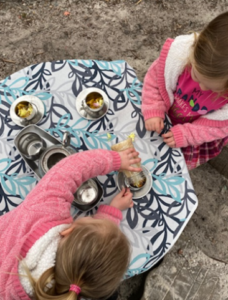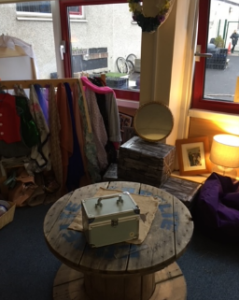Hi, I’m Louise Harrison, one of Falkirk Council’s team of Pedagogues, and I’m currently based with the fantastic team of practitioners in Bowhouse ELC. I joined the team just a couple of months before the C word was on everyone’s lips……..COVID of course! I think it’s probably fair to say that we’re all more than a little tired of COVID and are glad to see things eventually returning to some sort of normality. However, we cannot underestimate the impact that the pandemic, lockdown in particular, has had on our wee people.
In fact, some of our very youngest learners are coming to us having spent a significant portion of their lives in lockdown, massively limiting their experiences of the world around them compared to those born just a few years before and shrinking their social circle to that of immediate family. Add to this the wearing of face coverings, which make it difficult for children to differentiate between sounds such as ‘p’ and ‘t’ and virtually impossible to read facial expressions, and it is unsurprising that we are seeing an increase in difficulties with language development and social communication. And all this during the most critical developmental period for our wee people!
With all this in mind and with early language and social communication development as a priority on Bowhouse ELC’s Improvement Plan, we decided that part of our work this year would be to consider how pretend play can support children with this.
Why pretend play?
Whether domestic role playing in the home corner, zooming around as their favourite superhero, or using small world characters to create a scenario from their imagination, engaging in pretend play provides children with limitless opportunities for talk and interaction.
An environmental audit of current role play provision was carried out on 28th October which was then shared with the team.
Then………we began to plan!
- What resources would we need, and how many?
- Where could we get them from?
- Where should we set it up?
- How much space should it be given?
- What would our pedagogy around it look like? (eg. is fighting/weapon play acceptable?, can resources be transported?)
We identified that whilst it’s important for children to have access to pretend play opportunities throughout the setting (both indoors and out), it’s helpful to have space identified as the ‘role play’ area, where they know they can find dress up resources and props to support their play. However, this is obviously space dependant and is by no means essential. Let’s face it, children can and should engage in pretend play whenever and wherever the fancy takes them.
For the purpose of collecting data to measure the impact of the project, in consultation with key workers, 5 children were identified as our focus group. Baseline data was gathered for each of them using the Forth Valley Speech and Language pyramid, assessing where each child is currently functioning for each of the key components of language and communication.
When we began to think about how we would develop our pretend play provision, we did some research and had professional dialogue around the developmental stages of pretend play. We recognised that some of our children needed little more than their own imagination to create the play, some found this easier with the use of open-ended resources to prompt their creativity (boxes, material, pegs) and others would initially need some real objects to support them in developing imaginary play (household items, dolls, clothes). Taking all this into consideration we created our list of core resources, ensuring there was enough variety to support the developmental stages of all our wee people.
The dress up clothes were really instrumental in sparking the initial interest in pretend play, and led to the creation of lots of characters and rich descriptive language. This was then developed to include material, pegs, white t shirts and fabric pens to further enhance the creativity and imagination. Whilst pretend play offers a whole host of benefits for wee people, it’s been important to keep focussed on our aim of improving language development and social communication. This requires adults to be available and to be involved in the play (when appropriate) in order to provide new vocabulary and extend the play.
In order to provide a link with families, play boxes were created containing a variety of resources to initiate and support pretend play, again including both open ended and everyday objects. A short video was made demonstrating how they might be used and added to the boxes using a QR code, along with some information about how this type of play can support the development of language and social communication.
If you’d like further information, get in touch with me at louise.harrison@falkirk.gov.uk
By Louise Harrison



